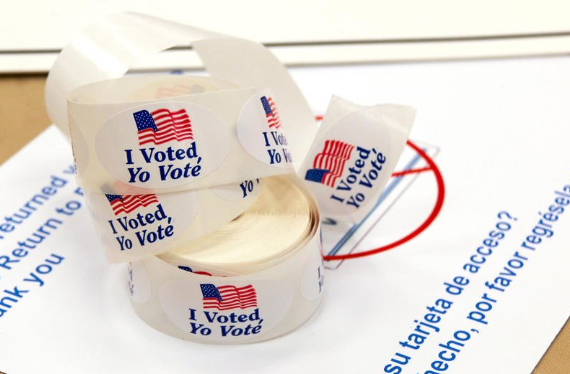Midterm election results
After weeks of counting, the final results are nearly in.

U.S. midterm elections are finalizing its results – these are the stickers given to voters.
December 2, 2022
Midterm elections overview
On Nov. 8, election polls closed for the 2022 midterm elections.
The midterm elections are general elections held during the midpoint of the president’s four-year term in office.
Federal offices that are up for election during this time include all seats in the United States House of Representatives for a two-year term, as well as 33-34 seats of the 100 in the United States Senate.
The House of Representatives and the U.S. Senate are the two bodies that receive the most attention, being that whichever party has control, creates the agenda.
Gary Nordlinger, a professor of politics at George Washington University, explains in the U.S. Embassy & Consulates article that the “majority party determines who leads important congressional committees.” Thus, the President’s ability to accomplish his agenda heavily relies on whether their party controls the two houses.
Districts redrawn
Representatives from the House are taken specifically based on each state’s population. Being that California is one of the most populated states, they have a large number of representatives with 52.
An independent state panel redraws the congressional districts in California, and was approved by the “state’s independent redistricting commission[which] voted unanimously on Dec. 20 to approve its final maps” according to Cal Matters.
The newly re-drawn political maps hold one fewer seat due to California’s flat population growth.
Districts are redrawn every 10 years to accommodate for the new population counts. After the 2020 census, the Hispanic population has become the largest ethnic group in the country. Thus, the new map increases representation for Hispanic voters, as there are now more districts where Hispanic or Latino people reside.
Despite waivered support for Gov. Gavin Newsom, he wins by millions.
Newsom faced a recall election that began before COVID-19 erupted in the U.S. The petition was started by Newsoms opponents to remove him as Governor since his term began in Jan. 2019.
Newsom is the 40th governor of California, and has roughly a two million vote lead on his opponent, Brian Dahle.
Republican Dahle has served as a member of the California State Senate from the first district since 2019, and is currently Newsome’s only competition.
Senate
Alex Padilla and Mark Meuser are currently running for U.S. Senate seat in California. Although, with a majority of votes counted for, it is clear that Democrat Padilla has won with over a two million vote lead.
Padilla has served as the junior U.S. senator since 2021 in California, and has served as the 32nd secretary of state from 2015 to 2021.
His opponent, Republican Meuser, focused on election, political, and constitutional law in the Dhillon Law Group. Meuser has been involved in numerous lawsuits against Newsom for his unconstitutional usage of power.
House of Representatives
Although there are 52 districts in California There are a few that are important races in the state.
In the 13th district, covering the Central Valley region, Adam Gray, a Democratic state assemblyman, and Republican businessman John Dauarte are running. This area has been a persistent battleground in California, and it tends to lean Democratic. Nevertheless, Republican Dauarte is winning by a slim margin, currently 50.22% to 49.78%.
Next, in the 22nd district, covering the San Joaquin Valley – which is also a strongly supported Democratic district. Republican incumbent David Valadao is running against five-term Democratic assemblyman Rudy Salas. With 95% of the votes counted, Valadao is winning with 51.6% to Salas’s 48.4%.
The most local being the 3rd district, covering numerous counties along the rural eastern border in right leaning Northern California, including Placer County. Republican Assemblyman Kevin Kiley and Democratic Navy veteran Kermit Jones are running for the open seat.
Kiley was born and raised in Granite Bay, and is endorsed by former President Donald Trump. Kiley was elected to the California State Assembly in 2016 and was twice re-elected. In 2020, Kiley received the most votes for a Republican candidate in California.
Within the five years Kiley served in the legislature, he authored school choice legislation, protections for sexual assault victims, new laws on freedom of speech, and criminal justice reform, to name a few. Most notably, Kiley has worked to advance economic freedom and suspend the gas tax.
Kiley’s opponent, Jones, was born in Michigan and served in the U.S. Navy from 2005 to 2009. Jones is a physician and policy advisor, and due to his background and knowledge of healthcare, Jones focuses on patient care and high prices of prescription drugs.
Currently, Kiley is the projected winner with a current 53.3% vote over Jones’ 46.7%. This win has put Republicans over the 218 seat requirement to control the house.
Proposition 1: Constitutional right to reproductive freedom. With a current 66.9% of voters wanting to establish this right, California’s Constitution will amend reproductive freedom, including the right to abortion and contraceptives.
Proposition 26: Sports betting regulation. This act would expand gambling at casinos and racetracks, however, 67% of voters pleaded to maintain the current betting rules, so this prop did not pass.
Proposition 27: Online sports betting regulation. This prop would make online and mobile sports betting legal for people 21 and older, however 82.3% have voted “no” on legalizing and taxing online sports betting.
Proposition 28: Require funding for arts education. With 64.4% of votes leaning towards required funding for K-12 arts education, this prop has passed.
Proposition 29: Strengthen dialysis clinic requirements. This proposition would set more staffing, requirements for kidney dialysis clinics, and additional reporting, however 68.4% voted “no.”
Proposition 30: This prop would affect those with an income above $2 million by imposing an additional 1.75% tax. The proceeds would go towards zero-emission vehicles, and 58% of voters voted “no” on this proposal.
Prop 31: Flavored tobacco ban referendum. This proposition would uphold S.B. 793, which would ban the sale of flavored tobacco products. 63.5% voted to continue banning flavored tobacco products.


